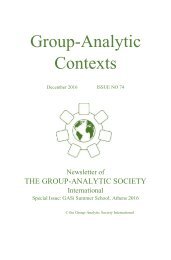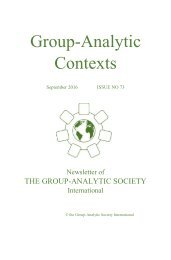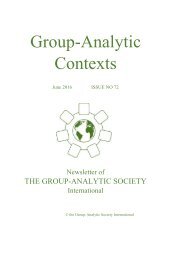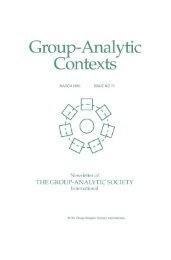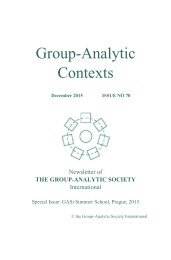Group-Analytic Contexts, Issue 80, June 2018
You also want an ePaper? Increase the reach of your titles
YUMPU automatically turns print PDFs into web optimized ePapers that Google loves.
84 <strong>Group</strong>-<strong>Analytic</strong> Society International - <strong>Contexts</strong><br />
And if it’s still raining and if you’re not a fan of ‘singing and<br />
dancing in the rain’ but a (potentially) diligent researcher, you’ll look<br />
at your list again and continue. Now you’ll have to identify your<br />
specific research question(s). You’ll state these unambiguously, as<br />
clearly as possible. Bear in mind when formulating your own<br />
hypotheses that your questions need to be potentially answerable.<br />
Measurable hypotheses are a good starting point. The statement<br />
(hypothesis) “group analytic groups are boring” is not a great<br />
hypothesis. Whilst it’s potentially answerable, it’s not specific enough.<br />
Moreover, it would assume that all analytic groups are the same. And<br />
the concept ‘boredom’ is relative. What’s boring for one person, might<br />
be of interest to another. “A 20-week group which uses mentalisation<br />
techniques will achieve a reduction in depression scores by 5 points”,<br />
would be a better hypothesis.<br />
Once you’ll have narrowed down your research area and<br />
formulated your hypothesis - what next? You’ll check for feasibility.<br />
Not whether you’d rather dance in wellies or trainers while singing in<br />
the rain … but whether your search problems and questions are<br />
feasible. What does this mean? Examine your list of problems<br />
critically while sipping another cup of tea. You can skip the latter but<br />
the former mandatory.<br />
Consider your resources, time and the availability of data (or<br />
their absence). Are your questions researchable? If they aren’t, go<br />
back to bed and start again. Think about your topic and be honest. Will<br />
you be motivated enough to carry it through? Will you be able to<br />
sustain your attention and continue with your research even on days<br />
when the sun will be shining, or a tempting cricket or football game<br />
will be on TV, or you can think of better things to do? If you answered<br />
‘yes’ to the former, continue. If your answer is “no” and you’d rather<br />
watch the footie, you know the drill.<br />
Finally, will your results be of interest to others? What<br />
interests you might be a waste of time or resources in the eyes of others.<br />
People who matter, like the ethics committee. You’ll need their<br />
approval. And now is not the time to say “I’ve overcome my ‘parental<br />
issues’, I’m not trying to gain their approval anymore, ‘cause it doesn’t<br />
matter …”<br />
Approval does matter. If the research/ethics panel says “no”<br />
to your research proposal and rejects it (not you, it’s not personal but<br />
professional), you’ll have to revise, or even scrap it. So, think critically<br />
about all the above issues beforehand to avoid disappointment. If you<br />
are unsure, phone a trusted friend (if s/he knows something about<br />
research). Or ask the GASi or IGA audience. Don’t go 50:50. The









